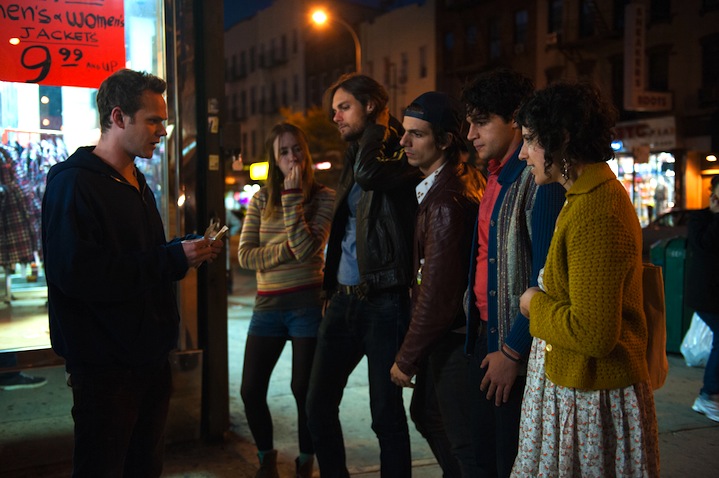
How do movies feel about the art world again? It seems to always be adversarial, to a point at which the bougie industry of pastels and fancy grants is never less than alien to a filmgoers’ worldview. But if that were entirely the case, why would they make so many movies about it—movies where art almost stands alone (you never seen a film set in the “art world” where people consider opting for catching a flick instead)? The symbiosis fascinates, and it’s too bad that a stagnant film like “Art Machine” doesn’t bother to add much to the conversation.

In Doug Karr’s directorial debut, a (probably too old) Joseph Cross plays seventeen-year-old prodigy Declan. After years of prosperous work, all of it exhibited as the creations of a maverick young artiste, the demand has ceased as he stands on the precipice of adulthood. His mother, Prudence (Joey Lauren Adams), has used his earnings to build their life together, keeping them both ensconced in the art world and at its mercy (Declan is oblivious to the fact that Prudence sleeps with the gallery owner in order to keep his pieces in circulation). The hope is that, despite diminished interest, Declan can burst forth with inspiration one more time—but the sum of his work is being grouped with his newer material. The baby-faced loner is effectively surrounded by reminders that he may have peaked, which don’t do wonders for a fragile mental state teased in casual hints at a previous hospital stay.
One evening, a blocked Declan finds himself detouring from his art teaching gig and falling in with a group of young artists, a collective that have lucked into the sort of clean, abandoned warehouse you only see in the “Step Up” universe. They’re like the Justice League of artists, a group of anarchist painters, dancers and graffiti spraying youngsters straight out of central casting. Because these young people seem freed by a complete lack of attachment to anyone from the outside world, particularly family, it finally seems like Declan’s safe place, a judgment-free zone where no one can make demands of him. Cutting to the point, it’s a bullshit movie conceit, and it’s really only Cross’s grounded, pleasant reactions to these findings that make any of it believable.
Conveniently, one of those artists happens to be young, attractive and available Cassandra. She’s played by Jessica Szohr, one of the stars of “Gossip Girl,” who has grown up to be less conventionally pretty in a generic Hollywood sense, but still breathtaking in a more worldly manner. Her eyes tell lies and her lips seem poised to say something romantic at every turn. It is unfortunate that her Cassandra is in the Manic Pixie Dreamgirl neighborhood, as there are interesting touches to her character, like a wavering devotion to her “artistic integrity,” but she’s mainly been designed as a device to bring the lead character out of his shell. Cassandra is also a pyrotechnic artist, but a late-film accident betrays both the character and Szohr’s obvious intelligence. She’s got the sort of presence that makes you wish Hollywood would cast her as something other than “The Girl,” and yet, here we are.

What works about “Art Machine” is that Declan’s re-awakening is alternately exciting and troubling. He starts racing a mile a minute, to the point where his streams of chaotic nonsense coming from his mouth seem less like a motivated artist and more like an autistic savant. Karr’s filmmaking gives these moments an air of danger: the “coming of age” experience in film tends to be one consistent experience, whether it’s a bed of roses or a sea of razors. Cross plays Declan’s awakening as exuberance, but the film manages to emphasize how not only his family is perplexed, but that his new friendships are damaged by his sudden intensity. Adams is quite good here; what we learn about her character is odious, but she manages to transcend that information to create a fully-formed person with honest regrets.
These dimensions add flavor to the film, which makes it all the more disappointing when the picture leans on blanket critiques and satire of the art world. The unease with Declan’s transformation proves interesting, but his assault on the art world seems like a confused mixture of contempt and hijinks. Karr came up through documentary filmmaking, and he knows how to turn the switch on an event to make it feel immediate and dangerous. Unfortunately, the picture strands its characters in the middle of this event, building to a climax that seems open-ended if only because the story, and its skimpy characters, has nowhere to explore. After a shocking late-film event (teased in the first scene), you kind of wish there was a third act to build on it. “Art Machine” ultimately doesn’t have the balls to go there, feeling like an interesting, unfinished pilot for a cable show that needed to add some “fucks” so it didn’t seem like it was for kids. [C]

